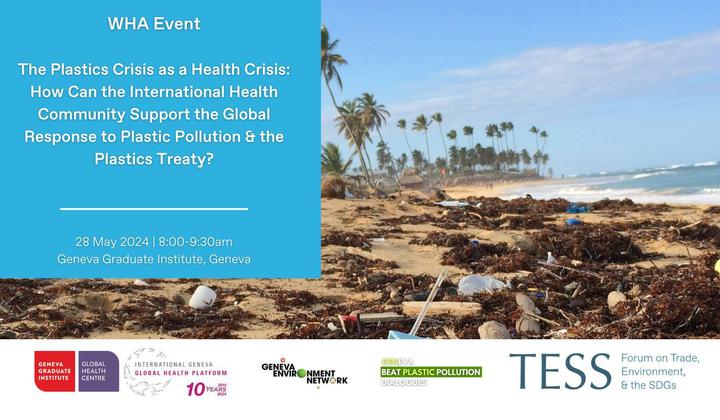This year, governments have a critical opportunity to protect the environment and human health from plastic pollution and the impacts of chemicals of concern in plastics.
The governments of Mexico and Switzerland, supported by the Forum on Trade, Environment & the SDGs (TESS), held this event that brought together INC Members and experts on the imperative of addressing chemicals of concern in plastic products in the future plastics treaty, and the pathways being explored to make that a reality.
A growing body of evidence demonstrates a range of adverse impacts to human health and the environment associated with chemicals of concern widely used in plastics and plastic products. The presence of these chemicals in plastics has impacts on human health and the environment across the full life cycle of plastics, including the potential to disrupt a safe circular economy. Many of these chemicals of concern are not addressed in existing international chemicals conventions, and a lack of transparency across supply chains means that the risks associated with their presence in plastic products cannot effectively be managed by governments or business in the absence of international cooperation and common global rules.
Member states of the United Nations are currently working to finalize negotiations of an international legally binding instrument on plastic pollution, including in the marine environment, based on a comprehensive approach that addresses the full life cycle of plastics.
During the last meeting of the Intergovernmental Negotiating Committee (INC) in Busan, Republic of Korea, in late 2024, 94 INC Members emphasized that the future plastics treaty text must include a clear, legally binding obligation to phase out the most harmful plastic products and chemicals of concern in plastics. Without such an obligation, these countries highlighted that the instrument will fail to deliver the predictable regulatory framework urgently needed by states, businesses, civil society, and the environment.
In recent months, a diverse range of governments have been exploring options for such an obligation, with the aim of establishing a global approach and mechanism that allows for evolution over time, promotes transparency and provides appropriate flexibility to account for different national circumstances. This event was an opportunity to hear about some of the pathways being explored.
Speakers - Panel of INC Members and experts
Tania Munoz, Director of Hazardous Materials and Waste, Ministry of Environment and Natural Resources, Mexico
Andrea Zbinden, Senior Policy Advisor and National Focal Point for UNEP and INC Plastic Polution, Federal Office for the Environment, Switzerland
Sam Adu-Kumi, National/Regional Expert on Chemicals and Waste, Ghana
Halatoa Fua, Director, National Environment Service, Cook Islands
Martin Wagner, Professor, Norwegian University of Science and Technology
Zhanyun Wang, Scientist, Empa-Swiss Federal Laboratories for Materials Testing and Research Technology & Society Laboratory
Jane Muncke, Managing Director and Chief Scientific Officer, Food Packaging Forum
Moderator: Lizzie Fuller, Senior Policy Advisor and Lead, Plastics Treaty, TESS
Addressing Chemicals of Concern in Plastics: Pathways to Protection of the Environment and Human Health in the Plastics Treaty
We encourage you to watch the full event video.
In collaboration with






